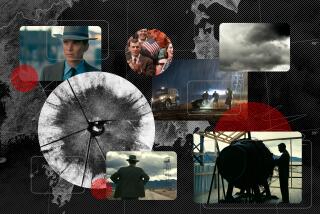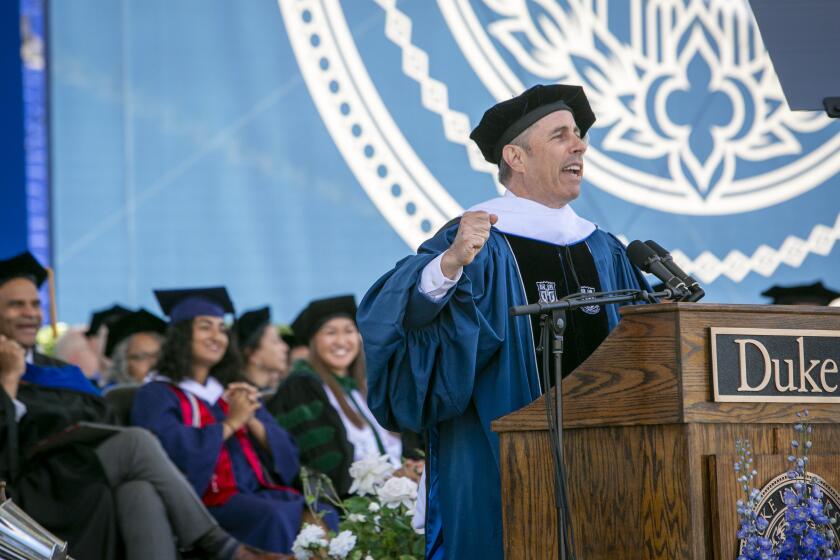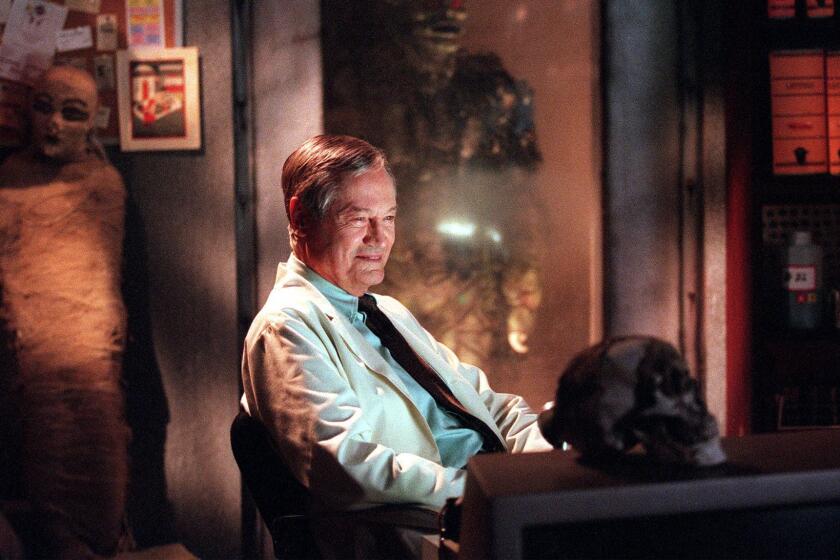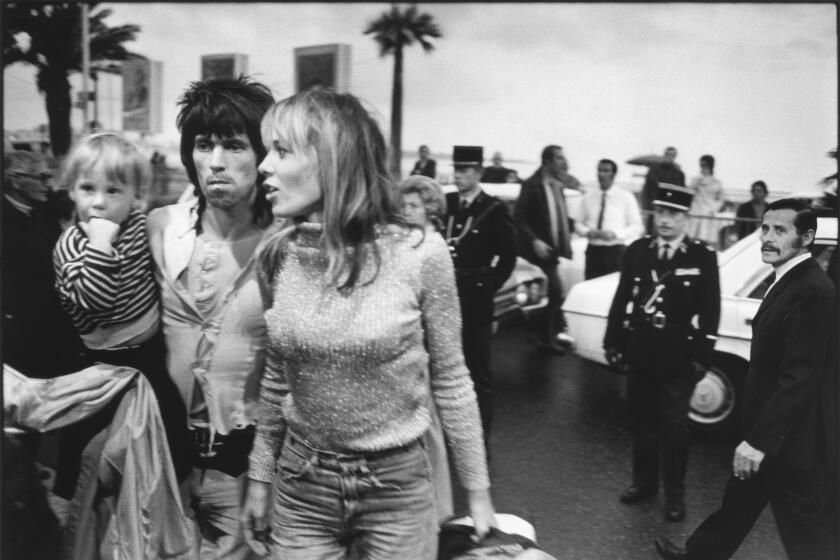The record of a mystical connection
As with an electron whose exact speed and location can never be determined at the same time, it is difficult to explain “Morvern Callar” in a way that does justice to the what-happens-next elements of its story and the feeling, the sensation, of watching it. The latest from acclaimed British director Lynne Ramsay, the film is a revolutionary head trip charged with energy and spirit that solidifies her position as one of the most interesting filmmakers at work in the world today.
A native of Glasgow, Scotland, the 32-year-old Ramsay began her career as a still photographer before moving to London to study cinematography. There she would make a series of prizewinning shorts before going on to write and direct her feature debut in 1999 with “Ratcatcher.” An evocative study of children struggling amid the bleakness of Glasgow’s tenement housing touched by a surrealist eye and a tender heart, the film would garner Ramsay more awards and positive critical notices around the globe.
“Morvern Callar,” which opens Friday, is adapted by Ramsay and Liana Dognini from the novel by Alan Warner. Its enigmatic title comes from the name of its lead character, a twentysomething grocery store employee in the Scottish hinterlands. As the film opens, she has come home one evening to find her boyfriend dead by his own hand, splayed across their living room floor near neatly wrapped Christmas presents and a series of instructions he left blinking on his computer screen. This sets her off on a journey of equal parts self-discovery and self-destruction that finds her trekking to the Spanish desert and beyond.
Anchored by the lead performance of Samantha Morton (best known for her Academy Award-nominated turn in “Sweet and Lowdown” and her appearance in last summer’s “Minority Report”), Ramsay’s film is able to go for long stretches with little to no dialogue, giving it a pulsing, hypnotic feel. Perhaps not since the mid-’60s work of Jean-Luc Godard and Anna Karina has a bond between director and performer been so palpable on screen. “She’s so mesmerizing to watch,” Ramsay says. “Like she’s in some kind of trance. Sometimes in the beginning I didn’t know when to say ‘cut.’ She just understood Morvern so deeply, it wasn’t about motivation or back story, it was about right now.”
The novel is told through Morvern’s first-person narration, a running monologue that nevertheless provides little insight into her thought processes and interior life. Decisions are never made, they simply occur, and Morvern -- inscrutable, somewhat scary and seemingly capable of anything -- remains a magnetic enigma throughout. Ramsay decided early on not to replicate the book’s narration with voice-over, so that often the viewer is simply watching Morvern think, trying to guess what might come next.
“I liked that she’s such an ambiguous character,” Ramsay says, “and if I lost that edge, I’d lose what was interesting. It can be frustrating for some people, but what was good about the character in the first place would be destroyed by explaining her too much. Even in her internal world she’s still a mystery. It reminded me of a western when the cowboy rides off in the end and you still don’t know what the deep root of his problem is.”
Though Ramsay has a key group of core collaborators she has worked with from her very first short films, including cinematographer Alwin Kuchler, editor Lucia Zucchetti, production designer Jane Morton and sound designer Paul Davies, she strives to keep things fresh and to remain challenged with each new project. For “Morvern Callar” she co-wrote the script with Dognini, a friend from film school who is primarily an animator, while also using an actor as casting director (he makes an appearance as the dead boyfriend) and a fine artist as her music supervisor.
By using crew members, mostly friends, who are somewhat out of their element, as well as casting nonprofessional actors for a handful of key roles (Morvern’s best friend and traveling companion is played by Kathleen McDermott, a Glasgow barber’s assistant), Ramsay hoped to constantly surprise everyone involved, including herself.
“The film is a trip, like a psychological road movie,” she says, “and I wanted to go there too. I want to be transported. I like when I see films myself and I don’t know exactly what’s going to happen. I wanted it to be a challenge to myself, because I didn’t want to make the same film twice. I was a bit sick of the social realism of ‘Ratcatcher.’ I grew up there, I come from there. This may be a departure, but I feel every film should be.”
‘A symbiotic thing’
If Morton was ever unsure of where to take a scene, she didn’t have to look far for an answer. As Ramsay recalls, “She said I was the only director she’s worked with who acted it all out off camera. I’d get so into it, I wasn’t even totally aware I was doing it. It was like a symbiotic thing.”
Comparing working with Ramsay to her experiences with other directors, the 25-year-old Morton says, “It’s the first time I’ve been directed by anyone in my age group. A lot of the formalities weren’t there. It felt much more human. The person talking is talking to you, not at you. A lot of people see actors as fodder, or a bit thick. You get people to drive you around, oh, we’ll make that call for you -- there was none of that. We were all equal and that was really, really refreshing.”
Morvern moves through a world of parties, music, drinking and drugs, and Ramsay isn’t shy about picking up the film’s inherent generational subtext. “You look at the world and you portray what you see,” she says. “And I think my generation has been given a culture that’s quite hedonistic and very cynical. People are looking for something more, but they don’t know exactly what that is. So people are drifting, they don’t know what it’s all about anymore, and I think that’s happening all over the world. You do think of those things when you make a film, what you’re trying to say and to whom.”
Even if “Morvern Callar” doesn’t broaden her audience, her next project, an adaptation of Alice Sebold’s best-selling novel “The Lovely Bones,” almost certainly will.
Hoping to shoot in America with her usual team of collaborators, Ramsay is understandably hesitant to discuss how she plans to bring the story of a young girl’s vision of the afterlife to the screen. Working again with co-writer Dognini, and having already completed a second draft, she will only allow that “we’re taking a definite approach, sort of a darker version of ‘It’s a Wonderful Life.’ ”
Ramsay and Morton regard “Morvern Callar” as a triumph not only for themselves as individuals but also for their collaboration on the character of Morvern Callar. Describing the bond they felt regarding Morvern, Morton simply says, “I found her completely contagious. It was just an immediate emotional connection. We both understood this woman. Sometimes Lynne would just say, ‘Morvern. Be Morvern.’ ”
More to Read
Only good movies
Get the Indie Focus newsletter, Mark Olsen's weekly guide to the world of cinema.
You may occasionally receive promotional content from the Los Angeles Times.







